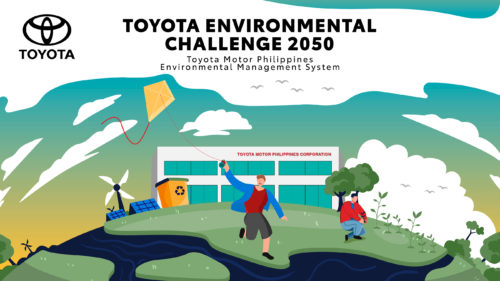
More people around the world are taking concrete action to contribute to saving the environment. In celebration of World Nature Conservation Day, Toyota Motor Philippines (TMP), a leading automotive company in the country, reaffirms its commitment to the environment through continuous sustainability efforts through the Toyota Environmental Challenge 2050.
Consistent with TMP’s mission to protect the environment, the company’s Environmental Management System aims to ensure the conservation and protection of the environment by establishing and maintaining a holistic approach in the management system for all TMP stakeholders to achieve the TEC 2050. Its approach covers the vehicle life cycle and business processes that can impact environmental performance based on the company’s targets.
TEC 2050 hopes to address six challenges that impact TMP’s new products and technologies and the community:
- New Vehicle Zero CO2 Emission
- Life Cycle Zero CO2 Emission
- Plant Zero CO2 Emission
- Minimizing and optimizing water usage
- Establishing a Recycling-based Society and Systems
- Establishing a Future Society in Harmony with Nature
As Toyota continues its sustainability efforts across the world, TMP implements measures to help solve the environmental problems in the Philippines caused by humans or natural disasters. TMP, together with its local suppliers and dealers, practices proactive measures to ensure its EMS and TEC2050 goal of zero or negative carbon footprint is achieved.
“Toyota Motor Philippines is committed to long-term sustainability to contribute to the development of the society as outlined in the Toyota Environmental Challenge 2050 or TEC2050. TEC2050 is our roadmap to achieve a positive impact on the environment by the year 2050,” TMP President Atsuhiro Okamato said.
Innovate next-generation vehicles
To pursue its vision of vehicles with minimal impact to the environment, Toyota has been developing next-generation vehicles with low or even zero CO2 emission. In the Philippines, TMP has been offering since 2009 different hybrid electric vehicle (HEV) options to Filipinos, including the Altis Hybrid and Cross.
While TMP has been expanding its HEV product line-up, it also has been using HEVs internally as service vehicles for Team Members. Likewise, it already converted 98 percent of production forklift vehicles to battery-powered and rechargeable one.
Aim for zero together
TMP also works closely with its suppliers and other business partners to achieve sustainability goals. TMP-EMS enhances the eco-design system from purchasing through logistics, embracing the use of renewable energy options to reduce CO2 emissions to improving packaging materials.
TMP also works with dealers to monitor and reduce CO2 emissions through kaizen and renewable energy.
Move to solar energy
Toyota hopes to reduce CO2 emissions and contribute to mitigating the adverse effects of climate change by turning to alternative sources of energy. In line with its goal of Plant Zero CO2 Emission in its manufacturing plant, TMP has installed a 1 Megawatt Solar Array in Santa Rosa, Laguna, which supplies 4 percent of plant’s power supply.
TMP continues to seek for alternative technologies and power sources that can adopted. Currently, the company plans to upgrade this with another 0.5 MW Solar Array. With this additional solar power, the company could cut electricity and CO2 to 718,200 kWh per year and 380,569 kg per year, respectively.
Improve wastewater management
Recognizing the growing global need for the limited water supply and keen to conserve this essential resource, TMP recycles water at its manufacturing site. It also harvests rainwater.
The company’s wastewater treatment plant can treat 55 cubic meters per hour of industrial wastewater with an upgraded membrane bioreactor technology. This enables TMP to promote sustainability at its operations by eliminating wastewater, establishing systems that use recycled water and increasing awareness about water conservation. TMP also enjoins its major suppliers and dealers to practice the same initiatives.
Build a recycling-based community
Besides using green technology in its production process, TMP is committed to practicing sustainable and eco-friendly practices across the company. It implements zero single-use plastic in its cafeteria and proper segregation of waste in all offices. In addition, waste minimization and recycling are carried out in both TMP plants and offices.
Through these simple daily practices, employees are encouraged to reduce their use of plastic, recycle and segregate things, encouraging them to be more responsible citizens in or out of TMP’s premises.
Establish a society in harmony with nature
What would be a better way to spend one’s work hours than in a place close to nature?
TMP provides its employees with opportunities to unwind, relax and appreciate the beauty of nature even while working. The company’s 11-hectare eco-forest located inside the Toyota Special Economic Zone in Sta. Rosa Laguna lets employees take a quick break from work to breathe and be one with nature.
The eco-forest likewise helps sustain biodiversity in the area with its growing range of flora and fauna.
The company is also very active in conducting different reforestation activities both in the upland and shoreline. Just recently, TMP adopted 10 hectares of mangrove area in Lian, Batangas which is part of the Verde Island Passage considered as the center of the center of marine shoreline biodiversity in the world.
Eyeing a sustainable future
Protecting the environment for the future generation is a goal accomplished by people working hand-in-hand.
In addition to implementing sustainable manufacturing practices, TMP helps control carbon emissions by providing consumers with an alternative mobility solution through TMP’s hybrid electric vehicle solution that enables consumers to carry out their daily activities without harming the environment further.
Toyota Motor Philippines is committed to sharing its expertise, innovations and experiences in sustainability with its partners and the community to achieve the common goal of a sustainable future for all.

